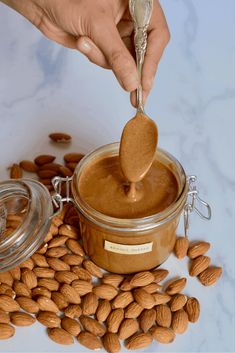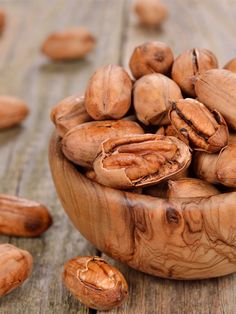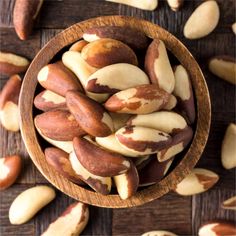Can Dogs Have Almond Butter? : Is It safe?, Health Benefits
Can dogs have almond butter? Although there are some health benefits to almond butter, pet owners should be aware of both the possible hazards and advantages of giving their dog pals this nutty treat.
IS ALMOND BUTTER SAFE FOR DOGS?

Almond butter can be safe for dogs in moderation, but it’s crucial to be aware of certain considerations. Almonds themselves are not toxic to dogs, and they contain healthy fats, protein, and vitamins.
However, almond butter often contains added ingredients like salt, sugar, or artificial sweeteners, which can be harmful to dogs in excess.
Before sharing almond butter with your canine companion, it’s essential to choose a variety without these additives and to introduce it gradually to monitor for any adverse reactions.
Additionally, some dogs may be allergic to almonds, so it’s advisable to consult with your veterinarian before making almond butter a regular part of your dog’s diet.
Always remember that treats should complement a well-balanced and nutritionally complete dog food rather than replace it.
TYPES OF NUT BUTTERS THAT ARE (AND AREN’T) SAFE FOR DOGS
| Type of Nut Butter | Safe for Dogs? | Notes |
| Almond Butter | Yes, in moderation | Choose natural and unsweetened varieties without harmful additives. Be mindful of your dog’s fat intake. |
| Peanut Butter | Yes, in moderation | Opt for unsalted, unsweetened peanut butter without xylitol. Avoid varieties with added sugars or artificial sweeteners. |
| Cashew Butter | Yes, in moderation | Ensure it’s unsalted and free from additives. Cashew butter is higher in fat, so be cautious with portion sizes. |
| Sunflower Seed Butter | Yes, in moderation | Check for unsweetened and additive-free options. Sunflower seed butter can be a good alternative for dogs with nut allergies. |
| Hazelnut Butter | Yes, in moderation | Choose unsweetened and unsalted hazelnut butter. Hazelnuts have a higher fat content, so offer it sparingly. |
| Pistachio Butter | Yes, in moderation | Opt for unsalted and additive-free pistachio butter. Keep in mind the potential for allergies and monitor portion sizes due to higher fat content. |
| Walnut Butter | Not Recommended | Walnuts can mold easily, producing toxins harmful to dogs. Additionally, the high-fat content can lead to digestive issues. |
| Macadamia Nut Butter | Not Recommended | Macadamia nuts are toxic to dogs and can cause symptoms like weakness and vomiting. Avoid any nut butter containing macadamia nuts. |
| Pecan Butter | Not Recommended | Pecans can develop molds that are harmful to dogs. The high-fat content in pecans can also lead to digestive problems. |
| Brazil Nut Butter | Not Recommended | High selenium content in Brazil nuts can lead to toxicity in dogs. Avoid giving your dog any nut butter containing Brazil nuts. |
WHAT IS IN ALMOND BUTTER?
Almond butter, a creamy spread crafted from ground almonds, is rich in healthy fats, protein, vitamins, and minerals.
While its purest form consists solely of almonds, commercially available varieties may contain additives for flavor, texture, or preservation, such as salt, sugar, or sweeteners.

It’s vital for consumers, especially pet owners sharing almond butter with dogs, to scrutinize labels for harmful additives.
Choosing natural and unsweetened options ensures a healthier choice for both individuals and their canine companions.
LIMITING YOUR DOG’S ALMOND BUTTER INTAKE
Limiting your dog’s almond butter intake is vital for their well-being, considering the potential risks of excessive consumption.
While almond butter provides some nutritional benefits, moderation is key to avoid issues like obesity or digestive upset due to its high fat content.
When introducing almond butter to your dog’s diet, start with small amounts and monitor for adverse reactions. Choose varieties without added salt, sugar, or artificial sweeteners, as these can be harmful.
Consult your veterinarian to determine the appropriate amount based on your dog’s size, health, and dietary needs.
Treats like almond butter should complement a balanced dog food diet, not replace it. Mindful portion control and regular health monitoring ensure your dog can enjoy almond butter as an occasional, tasty treat without compromising their overall well-being.
WHY CAN DOGS EAT NUT BUTTER AND NOT NUTS?
Dogs can safely enjoy nut butter in moderation, whereas whole nuts may pose risks due to potential choking hazards and digestion difficulties.
Whole nuts, like almonds or walnuts, can be challenging for dogs to chew properly, increasing the risk of choking or gastrointestinal issues.
In contrast, nut butter, with its smoother consistency, reduces the choking hazard. Certain nuts, such as macadamia nuts, can be toxic to dogs, making nut butter a safer alternative when sourced carefully and free from harmful additives like xylitol.
Moderation and awareness of potential allergens or additives are crucial when incorporating nut butter into a dog’s diet.
Consulting with a veterinarian can help determine the safest options for including nut butter in your dog’s treats or occasional snacks.
WHAT NUTS SHOULD DOGS AVOID?
Several types of nuts can be harmful to dogs and should be avoided in their diets. These include:
Macadamia Nuts
Macadamia nuts are particularly toxic to dogs and can cause symptoms like weakness, vomiting, and hyperthermia.

Walnuts

While not toxic, moldy walnuts can produce toxins that are harmful to dogs. Additionally, stomach problems may arise from walnuts’ high fat content.
Almonds
Almonds are not toxic in small quantities, but their hard texture can be difficult for dogs to digest, potentially causing choking or intestinal blockages.

Pecans

Pecans, like walnuts, can develop molds that are harmful to dogs. The high-fat content in pecans can also lead to digestive problems.
Pecans, like walnuts, can develop molds that are harmful to dogs. The high-fat content in pecans can also lead to digestive problems.
Brazil Nuts
High in selenium, consuming large quantities of Brazil nuts may lead to selenium toxicity in dogs.

It’s important to note that while some nuts are safe for dogs in moderation, others, like those listed above, can be harmful.
Additionally, always be cautious of salted or flavored nuts, as added seasonings can be detrimental to your dog’s health.
If you suspect your dog has ingested any harmful nuts or is displaying symptoms of distress, it’s crucial to seek veterinary attention promptly.
THE HEALTH BENEFITS OF ALMOND BUTTER FOR DOGS
Almond butter can offer certain health benefits for dogs when incorporated into their diet in moderation:
Rich in Healthy Fats
Almond butter contains monounsaturated fats, which can contribute to a healthy coat and skin for dogs.
Protein Source
Almonds are a good source of protein, and including almond butter in a dog’s diet can help support muscle development and maintenance.
Vitamins and Minerals
Almond butter provides essential vitamins and minerals, including vitamin E, magnesium, and phosphorus, which contribute to overall canine well-being.
Antioxidants
Almonds contain antioxidants that can help combat oxidative stress in a dog’s body, supporting their immune system.
Omega-3 Fatty Acids
While not as abundant as in some other nuts, almond butter does contain omega-3 fatty acids, which can contribute to a dog’s joint health and cognitive function.
Despite these benefits, it’s crucial to exercise caution and choose natural, unsweetened almond butter without harmful additives.
Additionally, moderation is key to prevent potential issues related to the high fat content.
Before introducing almond butter or any new food into your dog’s diet, consulting with a veterinarian is advisable to ensure it aligns with your dog’s specific health needs and dietary requirements.
5 WAYS TO ADD ALMOND BUTTER TO YOUR DOG’S DIET
Incorporating almond butter into your dog’s diet can be a tasty and nutritious addition. Here are five ways to do so responsibly:
Spread on Treats or Toys
Spread a small amount of almond butter on your dog’s favorite treats or toys. This can turn a regular snack or playtime into a more enjoyable and flavorful experience.
Mix with Dog Food
Mix a teaspoon or two of almond butter into your dog’s regular food. This can enhance the flavor and provide some additional nutrients. Ensure the almond butter is free from harmful additives like xylitol.
Freeze in Treats

Create frozen treats by filling a dog-friendly toy or ice tray with almond butter and freezing it. The frozen almond butter treat can be a refreshing and entertaining snack, especially during warmer months.
Use as a Pill Coating
If your dog needs to take medication, consider using almond butter as a pill coating. The flavorful disguise can make the medicine more palatable for your furry friend.
Homemade Dog Biscuits
Bake homemade dog biscuits with almond butter as one of the ingredients. You can find many dog-friendly recipes online that allow you to control the ingredients, ensuring a wholesome and delicious treat for your pet.

Always introduce almond butter gradually and in moderation, and be mindful of your dog’s overall diet.
Additionally, consult with your veterinarian to ensure almond butter is suitable for your dog, considering factors such as size, health, and any dietary restrictions.
TIPS FOR SHARING ALMOND BUTTER AND OTHER NUT BUTTERS WITH YOUR DOG
Sharing almond butter or other nut butters with your dog can be a delightful experience, but it’s important to do so responsibly. Here are some tips to keep in mind:
Choose Natural and Unsweetened Varieties
Opt for natural almond butter without added salt, sugar, or artificial sweeteners. These additives can be harmful to dogs, so selecting a pure and unsweetened option is the safest choice.
Check for Xylitol
Xylitol, a sugar substitute, is toxic to dogs. Ensure that the almond butter does not contain xylitol, as even small amounts can be dangerous for your furry friend.
Start Small
Introduce almond butter gradually and in small amounts. Monitor your dog for any adverse reactions, such as digestive upset or allergies, especially if it’s their first time trying it.
Monitor Fat Intake
While almond butter can provide healthy fats, it’s essential to be mindful of your dog’s overall fat intake. Too much fat can lead to digestive issues, so offer almond butter as an occasional treat in moderation.
Use as a Treat or Reward
Incorporate almond butter into your dog’s routine as a special treat or reward for good behavior. This helps associate the nut butter with positive experiences.
Be Aware of Allergies
Some dogs may be allergic to nuts. Watch for signs of allergies, such as itching, redness, or gastrointestinal distress. If you notice any adverse reactions, discontinue the almond butter and consult your veterinarian.
Consult with Your Veterinarian
Before introducing almond butter or any new food into your dog’s diet, consult with your veterinarian.
They can offer advice depending on the particular nutritional demands and health requirements of your dog.
By following these tips, you can safely share almond butter with your dog and make it an enjoyable and nutritious addition to their diet.
See also: Hypothyroidism in dogs
Frequently Asked Questions
Natural almond butter is the better option since it has a greater concentration of vitamins, minerals, and fiber, even if they both include some of the same components. However, peanut butter is a great option if you want to give your pet more protein.
A common artificial sweetener in many products, including certain nut butters, is xylitol, which is extremely harmful to dogs. So before you start sharing, always make sure to read the label on your almond butter.
One or two may not be problematic, but ingesting too many might result in nausea, vomiting, diarrhea, gas, and a loss of appetite. Almonds have a lot of fat, which might cause pancreatitis.
Seven Dog-Friendly Substitutes for Peanut Butter
Almond butter is safe for your dog to eat, but not all dogs can digest it. It’s advisable to keep it in moderation.
Are dogs allergic to almonds or almond butter?
High fat foods like almonds and almond butter can contribute to gastroenteritis (symptoms include vomiting, diarrhea, and bloody stool) and pancreatitis (severe nausea, vomiting, and stomach pain)
Conclusion
In conclusion, for dogs, choose natural, unsweetened almond butter, avoiding harmful additives like xylitol.
Introduce it gradually, emphasizing moderation to manage potential high-fat content issues. Prioritize consulting with your veterinarian before incorporating almond butter, ensuring a safe and beneficial treat for your canine companion.






